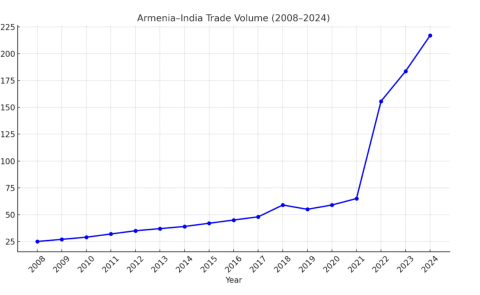
Future Prospects of US-Georgia Relations

Georgia’s strategic location south of Russia and north of Iran, along with its role as an energy corridor, makes it vital to US regional interests. However, between 2022 and 2025, the relationship has deteriorated, limiting cooperation and raising questions about the US posture in the South Caucasus. Despite efforts to improve ties, bilateral relations are unlikely to return to their pre-2022 state.
Since the early 2000s, the US and Georgia have developed a strong security and political partnership. Over 30,000 Georgian troops served in Iraq and Afghanistan under US and NATO commands, earning praise for their professionalism. Georgia actively participates in NATO exercises and receives US military aid to modernize its forces, strengthen border security, and enhance Black Sea operations, including Stinger missiles, patrol boats, and training programs.
The Russia-Ukraine war has increased Georgia’s strategic importance. The evolution of US-Georgia relations must be understood within the broader context of US foreign policy and Western strategy. The Biden administration’s primary focus in the region has been the war in Ukraine and countering Russia. In this context, Georgia is seen as an important partner but not a top priority compared to Ukraine or NATO’s defense of Poland and the Baltics. US and European policies toward Georgia have generally aligned. The European Union granted Georgia candidate status in December 2023, contingent on Tbilisi implementing reforms. US officials welcomed this move and often participated in joint US-EU-Georgia initiatives, such as those focused on border security and economic reform.
Despite this strategic alignment, the war in Ukraine has also created tensions in Tbilisi’s relations with Washington. These tensions culminated in 2024 with the US pausing the Noble Partner exercises and reviewing its entire defense relationship with Georgia. While military ties have not been completely severed, the US has emphasized that future cooperation depends on improved political conditions. Georgian officials have criticized this approach and called for a renewal of relations, expecting a different stance from the US.
It is also worth noting how Georgia’s ties with other powers influence US calculations. The US has supported pipeline and infrastructure projects in the South Caucasus to reduce Russian energy leverage. It has also monitored Georgia’s growing ties with China, particularly the approval of a Chinese-led consortium to build the Anaklia deep-sea port. From the US perspective, a strategically aligned Georgia would enhance US influence in the South Caucasus as a whole.
While political ties between Georgia and the US remain cooperative, a chill has set in since 2022. Washington has introduced targeted visa bans, scaled back military ties, and passed the 2025 Megobari Act, sanctioning several high-level Georgian officials. Georgia’s leadership has pushed back against these measures. The US has maintained engagement but adopted a tougher stance, linking aid and cooperation to democratic standards.
Donald Trump’s return to the White House raised hopes for improved relations with Georgia. However, no significant changes have occurred so far. While personal leadership matters, structural constraints prevent a swift renewal of bilateral ties. For instance, one major challenge is the US recalibrating its focus from the broader Black Sea region to the Indo-Pacific.
Another constraint is the shift in Georgia’s foreign policy, which is no longer exclusively pro-Western but increasingly multi-vectoral. This shift reflects global trends toward a multipolar system not dominated by a single power or even two, but by a range of actors. In this new geopolitical (dis)order, relying on a single partner could limit a country’s room for maneuver on the international stage. Instead, a multiplicity of options is seen as a valuable tool for advancing national interests in the modern era.
Georgia’s pivot away from the United States does not mean Tbilisi is entirely closing the door to integration with Western institutions or abandoning efforts to strengthen ties with Washington. In fact, Georgian officials have consistently emphasized the need to renew bilateral relations. The country (at least officially) remains committed to EU and NATO integration, as stipulated in its constitution, though it no longer prioritizes this goal as the sole or most decisive factor for its development. As alternative geopolitical options multiply, Georgia is pursuing a diversification of relations.
These geopolitical shifts suggest that US-Georgia relations will remain complex. The broader strategic context also matters. For example, if the war in Ukraine ends with a robust Western posture, Moscow’s influence in the region could be curtailed. Conversely, a Russian victory (even through a negotiated settlement in Ukraine) could lead to increased Russian geopolitical influence in the South Caucasus. In either scenario, the US is likely to show less interest in the region.
Emil Avdaliani is a professor of international relations at the European University in Tbilisi, Georgia, and a scholar of Silk Roads. He can be reached on Twitter/X at@emilavdaliani.
See Also


Between Tehran and Tel Aviv: Azerbaijan’s Neutrality Dilemma Amid Rising U.S.-Israel Tensions with Iran

From Neorealism to Neoliberalism: Armenia’s Strategic Pivot in Foreign Policy After the Nagorno-Karabakh Conflict

Georgia and Russia: New Turn in Bilateral Relations

3+3 Initiative as a New Order in the South Caucasus

